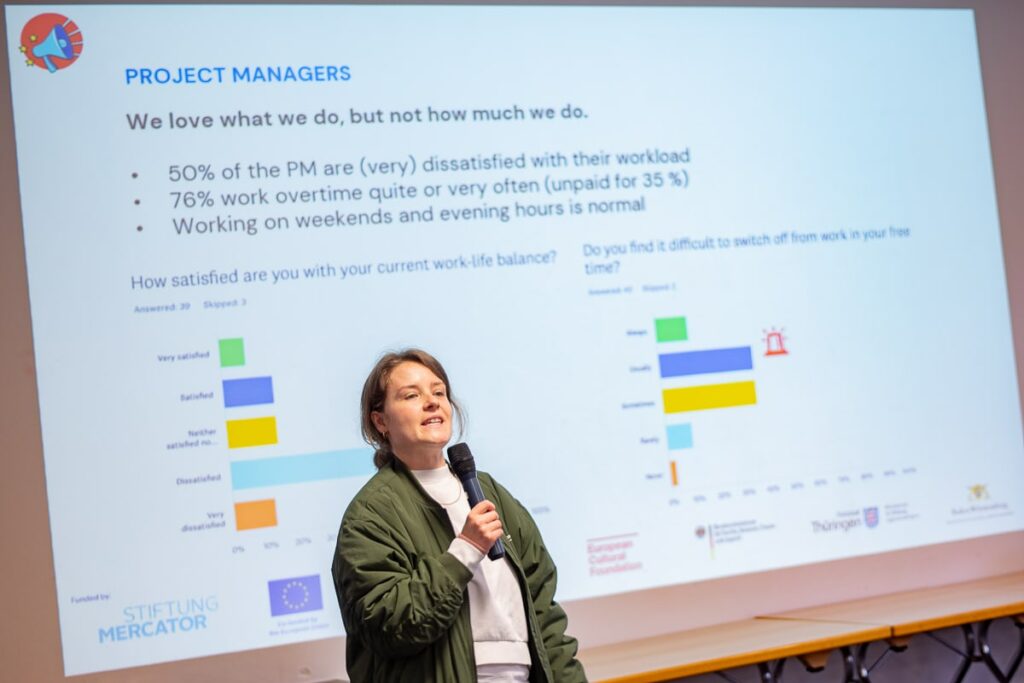Improving the conditions of young people and those who support them is one of the common goals of the 42 youth organisations that are active in the international network of Generation Europe – The Academy. But when it comes to well-being and mental health, what is the situation among those who are involved in the programme? To find out, a working group conducted surveys among the participating Project Managers, Youth Leaders and Ambassadors. In the following report, Marthe Behr, Kuldar Lilleõis and Leonie Reif put the results into context and formulate demands to tackle the problems.
Among many people, youth is considered the peak phase of life. Being young is often associated with freedom, being young and free. This association may go hand in hand with an inner image of young people celebrating, being self-confident and enjoying life. But in fact, the reality for many young people looks different.
Facts about the Mental Health Crisis
Almost one in five European boys aged 15 to 19 suffer from mental disorders, more than 16 percent of girls the same age. Nine million adolescents in Europe (aged 10 to 19) are living with mental disorders, with anxiety and depression accounting for more than half of all cases. According to UNICEF, suicides are the second leading cause of death for EU youth. Poor mental health is the most pressing health problem for European young people.

At the beginning of last year, the American Psychiatric Association (APA) declared a mental health crisis among young people. After two years of pandemic and its health, social and economic consequences, probably not too surprising for many of us. Nearly all teens faced social isolation and academic disruption, many lost caregivers, had a parent lose their job, or experienced physical and emotional abuse at home. But what became apparent during the pandemic is only the tip of the iceberg. Additionally, to all the difficulties the pandemic caused we see growing concerns about social media, violence, natural disasters, climate change and political polarization. And let’s not forget the fact that growing up itself can be a challenge. Youth and adolescents are phases of transition and request to adapt to a variety of changes. This elevates the vulnerability to suffer mentally.
Youngsters in the Generation Europe Network
Within our Network of Generation Europe – The Academy, we experience what research shows: During our Symposium “Youth Work in Europe: Mission (Im)Possible?”, held in November 2023 in Germany, we invited young people from Europe to share their thoughts and feelings on mental health. It became apparent that too many young people feel pressured and stressed, highlighted by the increased likelihood of burnout among Youth. Academic pressure and societal expectations emerged as significant stressors. These mental health issues can have a profound impact also on the physical well-being of young individuals.
For the young people, the stigma surrounding mental health creates an environment where they may feel inadequate or unsupported. They report a lack of emotional education and strategies to increase resilience and the ability to cope with stress. Furthermore, they feel confronted with insufficient support systems, both within schools and in the broader community. Long waiting times for specialized help outside established institutions further compound the challenges faced by young individuals seeking assistance.
Youth Work as a Support System
It’s normal to experience ups and downs as adolescents. But for a growing number of young people the balance between the ups and downs has gone off course. This also is a challenge for those who work with young people. Non-formal education and youth work can strengthen young people in their development. But young people in crisis have an even greater need for support and guidance. They need and deserve professionals that are capable of making appropriate offers of help. Unfortunately, in reality we see that many professionals themselves are challenged by an enormous workload, a widespread underpayment and a lack of professional training.

Surveys done in the network of Generation Europe – The Academy show that almost all professionals suffer from a high workload. Most of them are highly dissatisfied with their workload and work-life balance, as they are always or mostly unable to switch off from work in their free time. For many youth work professionals it is normal to work overtime, even without extra payment. Working on weekends? Nothing special.
Not surprisingly, 30 percent of the professionals state that their work has a negative impact on their well-being. More so, one in five reports suffering from bad or very bad mental health. As a multifaceted professional field, youth work places many demands on those who work in it. In addition to social skills, professionals need to be able to lead (international) projects, to plan and coordinate them, to secure financing and engage in networking and public relations, plus, not infrequently, to lead a team. That requires various skills and goes hand in hand with a great deal of responsibility. And yet we see, one of three Youth Workers in the Network does not have an educational background in the field. Only few professionals have access to supervision and training. This is an unacceptable situation in times of rapidly increasing challenges for young people and their support system.
What Needs to Change
Mental health of European youth and professionals in the field of youth work is an important issue which requires immediate attention. The mental health crisis must finally be taken seriously and mental illness must further be destigmatised. Young people must be provided with easy access to a support system that engages open dialogue, promotes resilience and offers rapid assistance in crisis situations. Therefore, we must act now! We conclude the following eight most urgent implications:
- Implement strategies for emotional education to equip individuals, including youth, with tools to navigate stress and pressures effectively.
- Foster strong community and social support networks to provide safer spaces for young individuals to openly express and discuss mental health.
- Advocate for increased access to proper training for youth workers to address the mental health needs of youngsters effectively.
- Improve and professionalize structures of youth work in Europe through long-term financial support, professional training and supervision services.
- Counteract increasing workload and unsatisfactory working conditions in Youth Work with more trained staff and fair pay.
- Advocate for accessible therapeutic resources, including the availability of therapists, to support those in need.
- Initiate and support awareness campaigns to reduce the stigma associated with mental health.
- Create a new narrative for success in life and academics, encouraging a broader definition beyond grades.
